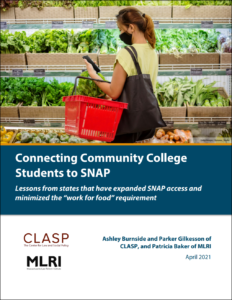New Report Recommends Pathways to Reduce Food Insecurity Among Community College Students
 Food insecurity is on the rise throughout the country, including for low-income college students struggling to complete their education. COVID has further exacerbated the crisis for students. In a national survey conducted in the fall of 2020, roughly three in five college students reported they are experiencing basic needs insecurity during the public health crisis.
Food insecurity is on the rise throughout the country, including for low-income college students struggling to complete their education. COVID has further exacerbated the crisis for students. In a national survey conducted in the fall of 2020, roughly three in five college students reported they are experiencing basic needs insecurity during the public health crisis.
College students have been left with unique and complicated challenges as a result of the pandemic. At the colleges that previously offered campus-based food pantries, donated “meal swipes” from paid meal plans, or subsidized cafeteria meals, remote learning has caused these options to mostly disappear — and for many students, even these gestures were not enough. Community college students — a group often including more first-generation college students from families with low income — have been especially impacted without the campus and community networks that provided them with resources prior to the public health crisis.
Yet policy barriers in the Supplemental Nutrition Assistance Program (SNAP), including student work requirements known as “work for food” rules, perpetuate this threat to student learning, health, and stability.
Although Congress authorized states to implement temporary measures to provide federal nutrition benefits or SNAP to more college students during the pandemic, these measures will likely expire by end of this calendar year. But Massachusetts has demonstrated a solution that other states could emulate to more permanently expand access to SNAP benefits for low-income community college students. (more…)
